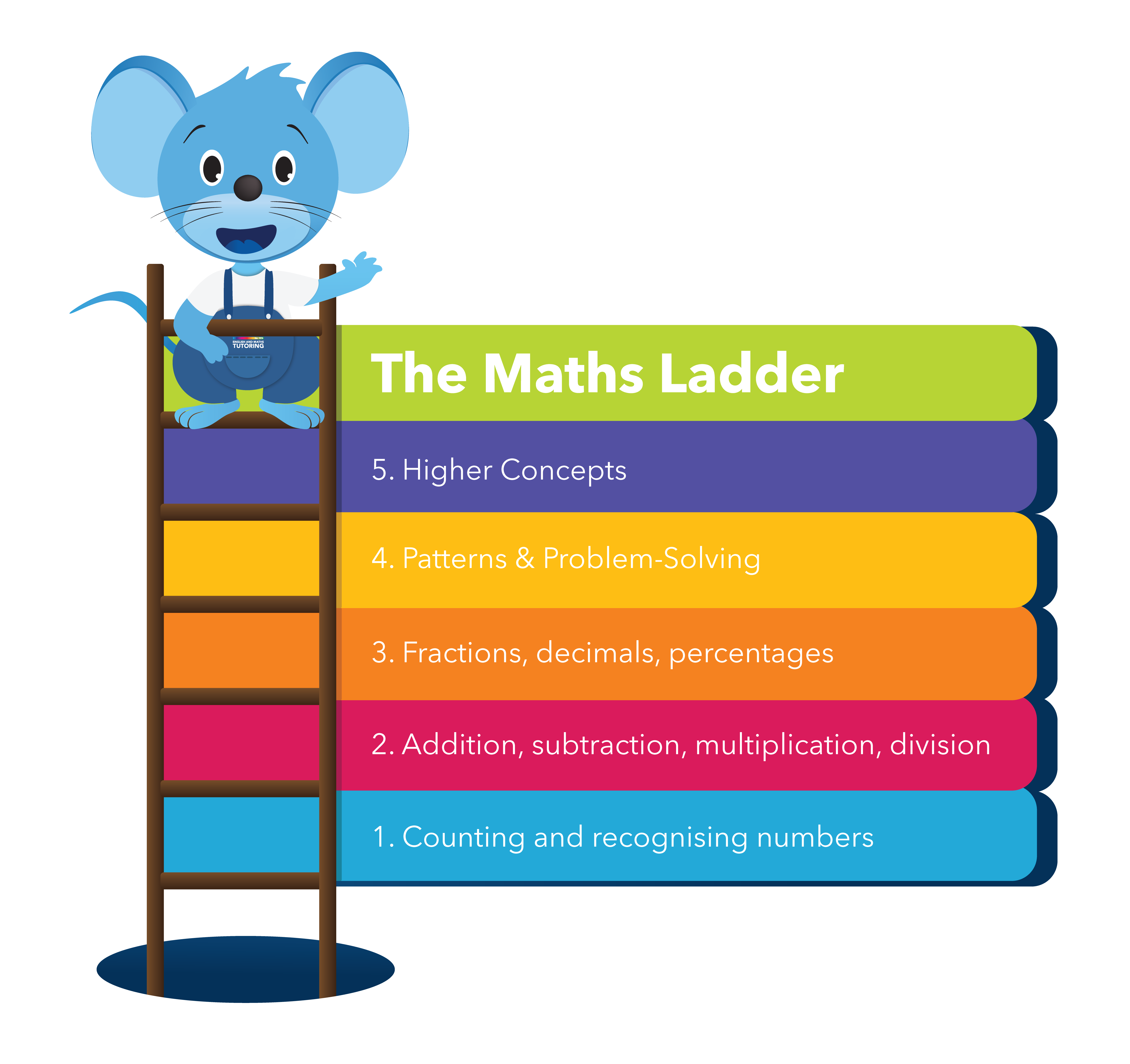Why ‘Early’ Matters
Developing strong number skills during early years can predict later success not just in mathematics but across learning as a whole. Preschool maths knowledge can forecast achievement in maths up to age 15, and even small gains in maths during early school years tend to carry forward. Where a student starts in maths sets the trajectory. By giving children a firm foundation in basic concepts right away we set them up to build confidence and success in later topics.
How Small Gaps Grow Over Time
Children start school with very different levels of number sense. Crucially, attainment gaps are already present at school entry and tend to widen as time goes on. That means a child who is even slightly behind early on may fall further behind each year. Without extra help to catch up, these small differences can become large over time. Students who miss foundational concepts may struggle later with advanced topics (fractions, algebra, etc.), so early deficits often compound. This cumulative ‘maths ladder’ means that intervening early is critical.
The Maths Ladder
Maths is highly sequential, new concepts build on prior ones. In fact, the UK Department for Education notes that “foundational knowledge, particularly proficiency in number, gives pupils the ability to progress through the curriculum at increasing rates later on.” Mastering basic skills unlocks later topics and allows children to learn more quickly as they move on. If a child climbs the early rungs of the ‘maths ladder’ well, they can ascend faster and higher, if they miss rungs, they may struggle to keep up.

Early Warning Signs
Parents and teachers can look out for persistent struggles with very basic maths ideas as red flags. For example, a child who is slow to learn to count or recognise numbers may need extra support. Other possible signs include:
Reliance on fingers or other visual aids for very simple addition/subtraction long after most peers stop using them
Difficulty connecting numerals (like “5”) with words (“five”) or quantities of objects
Trouble seeing simple patterns (e.g. not grouping objects by colour or shape) or getting confused when asked to put numbers in order
Frustration or anxiety about basic maths tasks, avoiding games or activities that involve counting, even in play
If a child consistently falls behind classmates on simple sums or number tasks, or a teacher expresses concern, it’s a cue to act. (These behaviours overlap with dyscalculia indicators, as experts note that children with serious maths difficulties often “need to use visual aids, like fingers, to help count”.) It’s always worth discussing with the child’s teacher if these warning signs appear, early detection makes it much easier to help.
Effective Early Interventions
Fortunately, well-designed early interventions can significantly accelerate children’s learning. Structured activities focused on counting, patterns and simple arithmetic often produce several months’ worth of extra progress in young children. An Education Endowment Foundation (EEF) review found that on average “early numeracy” approaches boost children’s learning by about seven additional months compared to peers who did not receive the extra support.
In practice, effective interventions share some common features, they diagnose each child’s gaps in understanding, use engaging concrete materials, and involve plenty of practice. They may include expert tutoring or teacher-led small-group work, plus hands-on resources to make abstract ideas tangible.
Small Group Tuition
Tutoring is an effective approach to boost learning. Tailoring these sessions to a child’s needs by targeting the exact concepts a pupil is missing is the key to this approach.
Kip McGrath tutoring centres ensure their programmes use these best practices. For instance, Kip McGrath employs fully qualified teachers who create personalised learning plans and use proven teaching methods and resources matched to each student’s level. Tutors work in very small groups so that every child gets plenty of guidance and feedback. By combining expert teaching with individualised support students build confidence as well as academic skills.
Practical Home Activities for Early Years
Parents can reinforce early maths at home with simple, fun activities. The good news is that you don’t need to be a maths whiz to help, even casual number talk and play can make a difference. Studies show that parental engagement in maths activities at home accelerates children’s learning. Some practical ideas include:
Counting games. Play simple number games together, like rolling dice and counting moves on a board or counting steps as you go up and down stairs. Board and card games naturally involve counting and comparing numbers, which reinforces basic arithmetic. Even rolling one or two dice and having the child collect that many objects or add the dice together turns play into counting practice.
Sorting and patterns. Ask your child to sort toys or objects (blocks, buttons, kitchen items) by colour, shape or size. Classifying things into groups helps them see patterns and understand sets and quantities. You can talk about which group has more or fewer items, building early number comparison skills.
Everyday number talk. Make maths part of daily routines by talking about numbers in context. Include your child when counting out snacks or setting the table. Discuss prices or measure ingredients in cooking together. Even turning on a timer or looking at the clock provides natural number practice. These casual conversations build number sense and show that maths is part of everyday life.
When to Act: An Intervention Checklist
Persistent struggle: If your child consistently misses questions on simple maths concepts that most peers handle, take notice.
Failed to catch up: Watch whether they are improving with current teaching. If end-of-term or school-year assessments repeatedly show them below the expected level for their age, it may be time to intervene.
Frustration or avoidance: Notice if your child says things like “I hate maths” or gets very upset during homework. High anxiety or refusal around number work is a signal.
Teacher recommendation: Listen to feedback. If a teacher suggests additional support in maths, it’s wise to consider extra help.
Missed milestones: Compare to age norms. If your child is far behind these learning milestones, plan to act.
Many schools offer maths booster groups or assessments. Outside school, you might consider maths tuition as a way of bridging the learning gap. Early action can reverse a downward trend.
Benefits of Early Maths Help
Early intervention pays off in both test scores and confidence. Evaluations of nursery and reception programmes have found measurable gains for children receiving extra support. For example, the EEF reports that a targeted early-years maths programme produced 2–3 additional months of progress in maths development by the end of reception on average. The effect was even larger for disadvantaged children, those on free meals or pupil premium who gained roughly six months’ extra progress.
In practical terms, these gains mean a child who might have been behind can catch up or even exceed expectations. Small-group tutoring studies consistently show +3 to +4 months’ learning in a year for students who get intensive help.
Beyond scores, early success in maths builds confidence and motivation. When a child finally understands a concept they had been struggling with, it often reduces anxiety and improves performance. Children who do well in basic arithmetic feel more positive about the subject and are more willing to tackle new challenges. This positive mindset itself can carry forward students stay engaged and learn more over time.
Getting help early means your child is ready to build on those skills later. Early success brings more success. The evidence is clear, investing time in early maths, through tutoring, focused school support, and home practice, yields big rewards. Children catch up quickly, learn more deeply, and approach future maths with confidence, setting them on a positive learning path for years to come.
Give your child the best start in maths. Book a free assessment with Kip McGrath today and discover how personalised support can unlock their confidence and set them on the path to long-term success.

 Login
Login Online Tutoring
Online Tutoring
